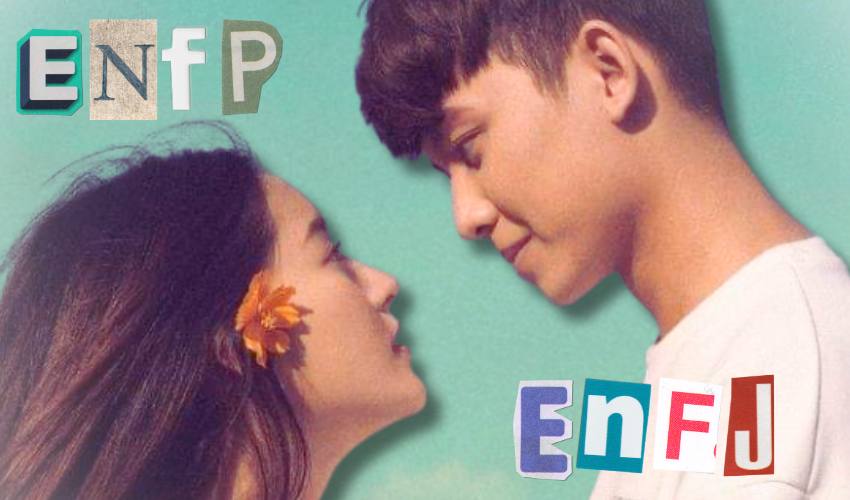In the context of the MBTI, each type has strengths and weaknesses. But those weaknesses represent blind spots and areas of difficulty faced by that particular type. In other types, these weaknesses may be strengths, and so it stands to reason that such a type may be an ideal source of guidance to types that struggle in their area of strength. Here is a look at the type best suited to help and even mentor each of the 16 MBTI types.
Best Mentor for INTP: ESTP
One of INTPs’ shortcomings lies in their way with people. Although they have an underlying desire to get along, be helpful and accepted, their capacity to do so may be hampered by social difficulties and blindspots. Among their problems may be a lack of awareness and insight into what other people want and desire. In addition to that, they may have a diminished capacity for understanding how to effectively influence and manipulate others opinions. That is where ESTP shines. The ESTP archetype is that of the promoter and this type can help the INTP communicate their ideas and reasoning in ways that could help them gain popularity. ESTPs have stronger extraverted feeling along with a dominant extraverted sensing. This grants them an ability to read people and situations in real time that INTP lacks. As a fellow introverted thinker, the ESTP can offer valuable insights that would probably make a lot of sense to the INTP. The ESTP can thus help INTP market their ideas and creative interests for financial gain and social benefit.
Best Mentor for INTJ: ISTP
INTJs have an inherent lack of faith in the status quo and are thus prone to looking for ways to improve, if not capitalize on it according to their future projections. They spend a lot of time and effort planning and analyzing rather than just experiencing and enjoying the moment. Because they are so inside their own heads, INTJs don’t like to approach much of anything without a well thought out plan. Their reliance on structure and systems can become a crutch that hampers their creativity and ability to improvise and adapt. ISTP presents a greater trust in their ability to figure things out as they go. They prefer to rely less on theory, speculation or abstract data and more on the concrete facts and data they can see and experience for themselves. To this end, ISTPs can help INTJ ground their judgment with more observable real world input which can often undercut or reveal exceptions to the conclusions they’ve drawn from abstract patterns and statistical trends.
Best Mentor for ENTP: INTJ
ENTPs are ideas people. They are the type of people who would realize that umbrellas are useful for other occasions besides when it’s raining. Umbrellas are also handy when it’s snowing and can provide a shady, UV blocking canopy on a hot sunny day. Where ENTPs tend to struggle is in their ability to hunker down and focus on ideas that they can develop and actually do something with. Because their thinking is highly associative and prone to diverging in a dozen different directions, it can be hard for ENTPs to stick to one thing and carry it out to completion. As a fellow intuitive, INTJs can appreciate the novelty and variety of ENTPs thoughts and ideas as opposed to say an ISTJ who might dismiss much of them for being impractical or a waste of time. INTJs can offer valuable feedback to them and also recognize the potential applications for ENTP’s conceptions. Furthermore, ENTPs can learn a lot from INTJ about how to organize their life better, especially as a means to achieving their goals and aspirations.
Best Mentor for ENTJ: INFJ
ENTJs are dynamic extraverts who are very competitive and motivated to accomplish their goals. They are statistically the highest earning MBTI type along with the ESTJ. As extraverts, their success is not likely to come from working in the background. Generally, they prefer to thrive in a more visible role like sales, entrepreneurship, management or teaching. A lot of their success rests on their ability to influence people, even manipulate them as a means to an end such as when closing a sale. ENTJs can often count on their confidence and charisma to get what they want but can sometimes do at other people’s expense. They can be lacking in their moral judgment, tact and understanding of other people’s needs and perspectives. ENTJs can learn from INFJ’s use of empathy and understanding to perhaps improve their relations and enhance their ability to influence others. INFJs can help ENTJ leverage psychological wisdom to foster better cooperation and support from others.
-

image credit: Severin Höin
Best Mentor for INFP: ESFP
INFPs are sensitive souls whose introverted nature can sometimes be very self-isolating. They have a lot to offer the world but it may take a lot of courage for them to show it. Shyness can keep them from seeking the spotlight or promoting their abilities and talents. The ESFP is a type whose confidence and energy can help embolden INFP to express themselves allowing others to discover what they are all about. ESFP can help them get out of their own way and get past a lot of the self consciousness that can often hold them back in life. Furthermore, INFPs can learn from ESFPs ability to seize their opportunities, be in the present and make the most of what they have. INFPs can get caught up in overthinking and being too self critical. Their idealism can lead them to procrastinate for fear of failure or not living up to their own expectations. ESFPs can show them why it’s sometimes better to just take action, have fun and not take life too seriously.
Best Mentor for INFJ: ENFP
The INFJ is someone who aspires to help people but may sometimes do so at their own expense. Conscientious, caring and perceptive, the INFJ is a very humane introvert who seems to understand people well. They use their insights to nurture and support as well as offer advice and compassionate material aid. However, being an INFJ also means that the desire for acceptance and to preserve social harmony can sometimes get in the way of their self interests. It can be hard for them to say no or deny others who want something from them. They can be reluctant to set appropriate boundaries when needed because it can make them feel guilty as if it made them a bad person to do so. This is less of a problem for ENFPs. By virtue of their introverted feeling, ENFPs put their personal feeling values above external group values and obligations. ENFPs can help impress upon the INFJ the importance of advocating for themselves and not allowing others to selfishly exploit their compassion and generosity.
Best Mentor for ENFP: ISFJ
ENFPs are fun and friendly people, full of life and creative energy. As idealists they are always seeking for something better. Although they are solid, loyal friends, they can also be opportunistic and skittish. This can affect their relationships and make it hard for them to settle and commit long term. They tend to be romantics but can often set themselves up for disappointment with unrealistic expectations. They are also prone to boredom and losing interest quickly. ISFJs tend to be more realistic about their expectations and what they want and can teach ENFPs something about appreciating what’s in front of them and being patient. People can appreciate ISFJ’s loyalty and willingness to stick around and commit to a person or group even when they might have more enticing opportunities elsewhere. Doing this can allow ENFP to build up deeper trust and a better reputation among others that can pay off down the road.
Best Mentor for ENFJ: ISFP
ENFJs are highly idealistic people-persons who like to feel they are a part of a group. They seek out meaningful relationships and they seek to use understanding, compassion and diplomacy in their dealings with others. It also happens to be that ENFJs place a lot of pressure on their shoulders. Their idealism and perfectionism also affects the image and standards they create for themselves. They can be very self critical and sometimes worry too much, about other’s well-being as well as other’s perceptions about them. Because of their auxiliary Ni, ENFJs can be neurotic and stressed about things they fear might happen. As a type who tends to live in the moment and take things as they come, ISFP can help ENFJ embrace more positive thinking and self acceptance. ISFPs tend to be more easygoing and focused on the here-and-now. ENFJs can learn from ISFJ not to take life too seriously and to also trust themselves and their ability to deal with whatever might come their way.
Best Mentor for ISTJ: INTP
ISTJs are great at handling responsibilities and performing what is expected of them. They do so with a lot of integrity and attention to detail. When they have a clear plan or set of instructions and procedures to follow, that is what works best for them. They are good at learning a process, memorizing it and faithfully performing it to standard. Where ISTJs fall short is in situations for which there is no clear plan or procedure. Situations where there are logistical problems or inefficiencies and no conventional solutions. For ISTJ, such circumstances are very frustrating to deal with. For the INTP however, this can often be taken as an opportunity to flex their problem solving muscles. INTPs can help ISTJs to embrace more of an engineering mindset that uses creativity to solve problems for which no standard solutions are available. Instead of getting stressed or kvetching about problems, INTP can help them open their mind to alternatives, think outside the box and get creative.
Best Mentor for ISFJ: ENFJ
ISFJs are kind, service-oriented Individuals who are highly loyal and dependable. They however are also very sensitive and prone to taking many things personally. This leads them to sometimes take offense where none was intended or to unjustly suspect others of malice. ENFJs for their part, are better readers of people and show a greater penchant for understanding contextual and subtextual meaning behind what people say and do. They have instinctive psychological insights that ISFJs could benefit from learning. ENFJs through their larger perspective, can help ISFJ see past the negative or otherwise limiting views informed by their dominant introverted sensing memories of past events and prejudicial notions.
Best Mentor for ESFJ: ISTJ
ESFJs are orderly, warm extroverts who make it their business to serve and protect others. Their focus is on people and being a valuable and appreciated contributor to their respective group or larger community. Because they prioritize comfort, harmony and group solidarity they may push for these interests but sometimes at the expense of what is objectively fair or sustainable. ISTJs have a stronger sense of logistics and how to go about implementing such an agenda. ESFJs can learn from ISTJs how to think more objectivistically and not allow their desire to please and accommodate others to get carried away with promises they cannot keep or policies that are doomed to fail because they defy logic.
Best Mentor for ESTJ: INFP
The ESTJ is a type who is comfortable with taking charge and telling people what to do. Their strong moral convictions and commitment to duty can often earn them a position of authority and respectable status in society. They however, are not the most sensitive type. Although they may strive to be fair, just and objective, they can be rather stern or harsh in their judgment. Moreover, they may show a lack of tolerance and a tendency toward black and white thinking. The INFP can help ESTJ to understand moral nuances and to be more humane in their approach. ESTJs can get preoccupied with taking action and getting results without fully considering the impacts and effects on people. INFP can help ESTJ find creative, inspired ways to achieve their objectives without alienating or causing emotional damage to others.

- the ESTJ instructor
Best Mentor for ISFP: ENTJ
These kind, unimposing souls tend to blend in with their surroundings because they aren’t highly vocal or outspoken with their opinions. They tend to withhold a lot of their thoughts and observations, preferring instead to go with the flow and avoid causing drama. Similar to the INFP, they may have difficulty calling attention to themselves through direct verbal means. It is through their actions, talents and interests that they primarily rely on to garner attention and attract others to them. ENTJs have the vision and foresight that ISFPs would like to have in order to capitalize on their creative or otherwise self indulgent interests. Typically, ISFPs would like an audience but don’t necessarily know how to go about acquiring it. Their tertiary Ni and inferior Te grant them a hint of insight, but ENTJs thrive in this area. ENTJs have a big picture, intuitive perspective that can help steer the ISFP in a fortuitous direction that capitalizes on their strengths.
Best Mentor for ISTP: ESFJ
ISTPs are notorious for their lack of emotional expression and sensitivity. They are generally depicted as stoic and phlegmatic but highly skillful in some area. They tend to have tactical, mechanical prowess but may also cultivate impressive linguistic skills (ie. Eminem). Human connection can present a difficulty for them. They tend to suppress a lot of their emotions and this can lead to explosive outbursts that catch others off guard. ESFJs can help ISTPs manage their emotions through sharing with others and connecting with a group. ISTPs are prone to isolating themselves or otherwise limit social contact, preferring instead to immerse themselves in mostly solitary activities. From ESFJ, they can learn how to be more open and communicative about what they are feeling and find resolution before it builds up to an unhealthy level of bottled resentment.
Best Mentor for ESFP: ENTP
ESFPs and ENTPs share a mutually willful and spontaneous nature. They are dynamic and responsive to their environment and are generally witty and fun to be around. Compared to the ENTP however, ESFPs tend to lean toward emotional immaturity. Their appetite for fun and pleasure can lead them to be reckless with money or otherwise negligent about managing finances. ENTPs tend to be better at not falling prey to things like emotional spending and bad decisions fueled by transient moods. ENTPs can help ESFP be more level headed and rational with their actions and responses instead of being emotionally reactive or taking things personally. The ability to reframe perspective and consider different angles and options, is a skill ENTPs can help ESFP develop.
Best Mentor for ESTP: ESTJ
ESTPs are also referred to as “the Promoter” because they read people well and understand what to say to get the reactions they want to get from them. They can be very energetic, charismatic and personable and this can earn them popularity and prestige. ESTJs could benefit from ESTP’s way with people but they also have a thing or two they could help ESTP improve on. Namely, ESTPs have a penchant for being fast and loose when it comes to following rules and guidelines. They are more apt to bend the rules, cut corners or exploit loopholes when they can. This can give them a competitive edge against others but it can also get them in trouble and also damage their reputation if taken too far. ESTJs can help instill in the ESTP a more honest ethic and a respect for due process. Patience and discipline are values ESTJs promote and they can help ESTP to be more accountable for what they say and do in respect to other people.
related posts:
- Here is the MBTI type & Zodiac sign of Dragon Ball Characters
- These Are the 3 Most Dangerous MBTI Types
- Who You Should Date Based on Your MBTI Type
- What Each MBTI Type is Most Hated For
- The School of Philosophy You Live By Based on MBTI type
- The Cognitive Blind Spots of Each MBTI Type
- What Drives You In Life Based On MBTI Type
- ISFJ and ISTJ in love: 5 Essential Dynamics of their Relationship - February 24, 2024
- ENTP and ENTJ in love: 6 Critical Dynamics of Their Relationship. - February 18, 2024
- ESTJ and ESFJ in love: 4 Key Aspects of their Relationship. - February 12, 2024







